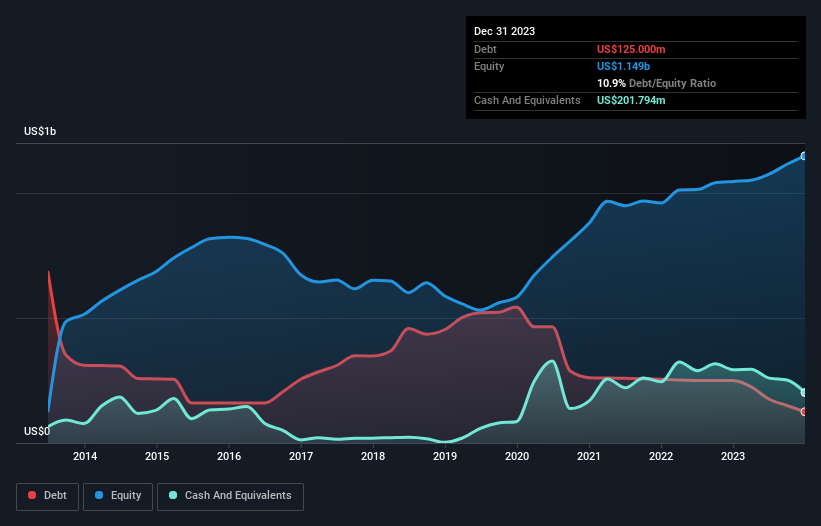- United States
- /
- Food and Staples Retail
- /
- NasdaqGS:SFM
Is Sprouts Farmers Market (NASDAQ:SFM) Using Too Much Debt?

Some say volatility, rather than debt, is the best way to think about risk as an investor, but Warren Buffett famously said that 'Volatility is far from synonymous with risk.' When we think about how risky a company is, we always like to look at its use of debt, since debt overload can lead to ruin. We can see that Sprouts Farmers Market, Inc. (NASDAQ:SFM) does use debt in its business. But the real question is whether this debt is making the company risky.
Why Does Debt Bring Risk?
Debt and other liabilities become risky for a business when it cannot easily fulfill those obligations, either with free cash flow or by raising capital at an attractive price. In the worst case scenario, a company can go bankrupt if it cannot pay its creditors. However, a more frequent (but still costly) occurrence is where a company must issue shares at bargain-basement prices, permanently diluting shareholders, just to shore up its balance sheet. By replacing dilution, though, debt can be an extremely good tool for businesses that need capital to invest in growth at high rates of return. When we examine debt levels, we first consider both cash and debt levels, together.
View our latest analysis for Sprouts Farmers Market
What Is Sprouts Farmers Market's Net Debt?
The image below, which you can click on for greater detail, shows that Sprouts Farmers Market had debt of US$125.0m at the end of December 2023, a reduction from US$250.0m over a year. However, its balance sheet shows it holds US$201.8m in cash, so it actually has US$76.8m net cash.

How Healthy Is Sprouts Farmers Market's Balance Sheet?
The latest balance sheet data shows that Sprouts Farmers Market had liabilities of US$546.9m due within a year, and liabilities of US$1.63b falling due after that. Offsetting this, it had US$201.8m in cash and US$53.9m in receivables that were due within 12 months. So its liabilities total US$1.92b more than the combination of its cash and short-term receivables.
This deficit isn't so bad because Sprouts Farmers Market is worth US$6.75b, and thus could probably raise enough capital to shore up its balance sheet, if the need arose. But we definitely want to keep our eyes open to indications that its debt is bringing too much risk. While it does have liabilities worth noting, Sprouts Farmers Market also has more cash than debt, so we're pretty confident it can manage its debt safely.
The good news is that Sprouts Farmers Market has increased its EBIT by 5.6% over twelve months, which should ease any concerns about debt repayment. When analysing debt levels, the balance sheet is the obvious place to start. But it is future earnings, more than anything, that will determine Sprouts Farmers Market's ability to maintain a healthy balance sheet going forward. So if you're focused on the future you can check out this free report showing analyst profit forecasts.
Finally, a company can only pay off debt with cold hard cash, not accounting profits. While Sprouts Farmers Market has net cash on its balance sheet, it's still worth taking a look at its ability to convert earnings before interest and tax (EBIT) to free cash flow, to help us understand how quickly it is building (or eroding) that cash balance. Over the most recent three years, Sprouts Farmers Market recorded free cash flow worth 69% of its EBIT, which is around normal, given free cash flow excludes interest and tax. This free cash flow puts the company in a good position to pay down debt, when appropriate.
Summing Up
Although Sprouts Farmers Market's balance sheet isn't particularly strong, due to the total liabilities, it is clearly positive to see that it has net cash of US$76.8m. And it impressed us with free cash flow of US$240m, being 69% of its EBIT. So we don't have any problem with Sprouts Farmers Market's use of debt. The balance sheet is clearly the area to focus on when you are analysing debt. But ultimately, every company can contain risks that exist outside of the balance sheet. For example, we've discovered 1 warning sign for Sprouts Farmers Market that you should be aware of before investing here.
At the end of the day, it's often better to focus on companies that are free from net debt. You can access our special list of such companies (all with a track record of profit growth). It's free.
New: Manage All Your Stock Portfolios in One Place
We've created the ultimate portfolio companion for stock investors, and it's free.
• Connect an unlimited number of Portfolios and see your total in one currency
• Be alerted to new Warning Signs or Risks via email or mobile
• Track the Fair Value of your stocks
Have feedback on this article? Concerned about the content? Get in touch with us directly. Alternatively, email editorial-team (at) simplywallst.com.
This article by Simply Wall St is general in nature. We provide commentary based on historical data and analyst forecasts only using an unbiased methodology and our articles are not intended to be financial advice. It does not constitute a recommendation to buy or sell any stock, and does not take account of your objectives, or your financial situation. We aim to bring you long-term focused analysis driven by fundamental data. Note that our analysis may not factor in the latest price-sensitive company announcements or qualitative material. Simply Wall St has no position in any stocks mentioned.
About NasdaqGS:SFM
Sprouts Farmers Market
Engages in the retailing of fresh, natural, and organic food products under the Sprouts brand in the United States.
Outstanding track record with excellent balance sheet.
Similar Companies
Market Insights
Community Narratives




